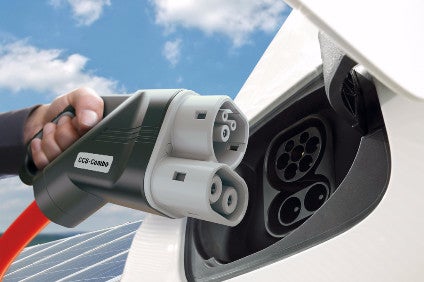
BMW, Daimler, Ford and Volkswagen Group have announced plans for a joint venture to establish an ultra-fast, high-power charging network along major highways in Europe similar to Tesla’s pioneering Supercharger network (for which the US-based rival will start charging its new car buyers next year).
The automakers – Volkswagen Group will include Audi and Porsche – have signed a memorandum of understanding (MoU) to create what they claim will be “the highest-powered charging network in Europe”. The goal is the quick build-up of a sizable number of stations to enable long-range travel for battery electric vehicle drivers.

Discover B2B Marketing That Performs
Combine business intelligence and editorial excellence to reach engaged professionals across 36 leading media platforms.
“This will be an important step towards facilitating mass-market BEV adoption,” the four said in a joint statement on Tuesday.
The projected ultra-fast high-powered charging network with power levels up to 350 kW “will be significantly faster than the most powerful charging system deployed today”, the statement said. Tesla’s is up to 120kW.
Work on the new network is planned to start in 2017 with an initial target of about 400 sites in Europe.
“By 2020 customers should have access to thousands of high-powered charging points. The goal is to enable long-distance travel through open-network charging stations along highways and major thoroughfares, which has not been feasible for most BEV drivers to date. The charging experience is expected to evolve to be as convenient as refuelling at conventional gas stations,” the automakers said.
The network will be based on Combined Charging System (CCS) standard technology and the planned infrastructure expands the existing technical standard for AC and DC charging “to the next level of capacity for DC fast charging with up to 350 kW”.
“BEVs engineered to accept this full power at charge stations can recharge brand-independently in a fraction of the time of today’s BEVs. The network is intended to serve all CCS equipped vehicles to facilitate BEV adoption in Europe,” the automakers said.
“This high-power charging network provides motorists with another strong argument to move towards electric mobility,” sais BMW chairman Harald Krüger in the statement. “The BMW Group has initiated numerous public charging infrastructure projects over the last years. The joint project is another major milestone clearly demonstrating that competitors are combining forces to ramp-up e-mobility.”
Daimler chairman Dieter Zetsche said: “The breakthrough of e-mobility requires two things: convincing vehicles and a comprehensive charging infrastructure. With our new brand EQ, we are launching our electric product offensive: by 2025, our portfolio will include more than 10 fully electric passenger cars. Together with our partners, we are now installing the highest-powered charging infrastructure in Europe. The availability of high-power stations allows long-distance e-mobility for the first time and will convince more and more customers to opt for an electric vehicle.”
“A reliable, ultra-fast charging infrastructure is important for mass consumer adoption and has the potential to transform the possibilities for electric driving”, added Ford president and CEO Mark Fields. “Ford is committed to developing vehicles and technologies that make people’s lives better, and this charging network will make it easier and more practical for customers across Europe to own electrified vehicles.”
“We intend to create a network that allows our customers on long-distance trips to use a coffee break for recharging”, said Audi chairman Rupert Stadler. “Reliable fast charging services are a key factor for drivers to choose an electric vehicle. With this cooperation we want to boost a broader market adoption of e-mobility and speed up the shift towards emission-free driving.”
Porsche chairman Oliver Blume said: “There are two decisive aspects for us: ultra-fast charging and placing the charging stations at the right positions. Together, these two factors enable us to travel in an all-electrically powered car as in a conventional combustion engine vehicle. As an automobile manufacturer, we actively shape our future by developing all-electrically powered vehicles and by building up the necessary infrastructure as well.”
The automakers said they intend “to make substantial investments to create the network, underscoring each company’s belief in the future of electric mobility”.
While the founding firms will be equal partners in the joint venture, other automobile manufacturers will be encouraged to participate in the network. The JV is also open for cooperation with regional partners.






